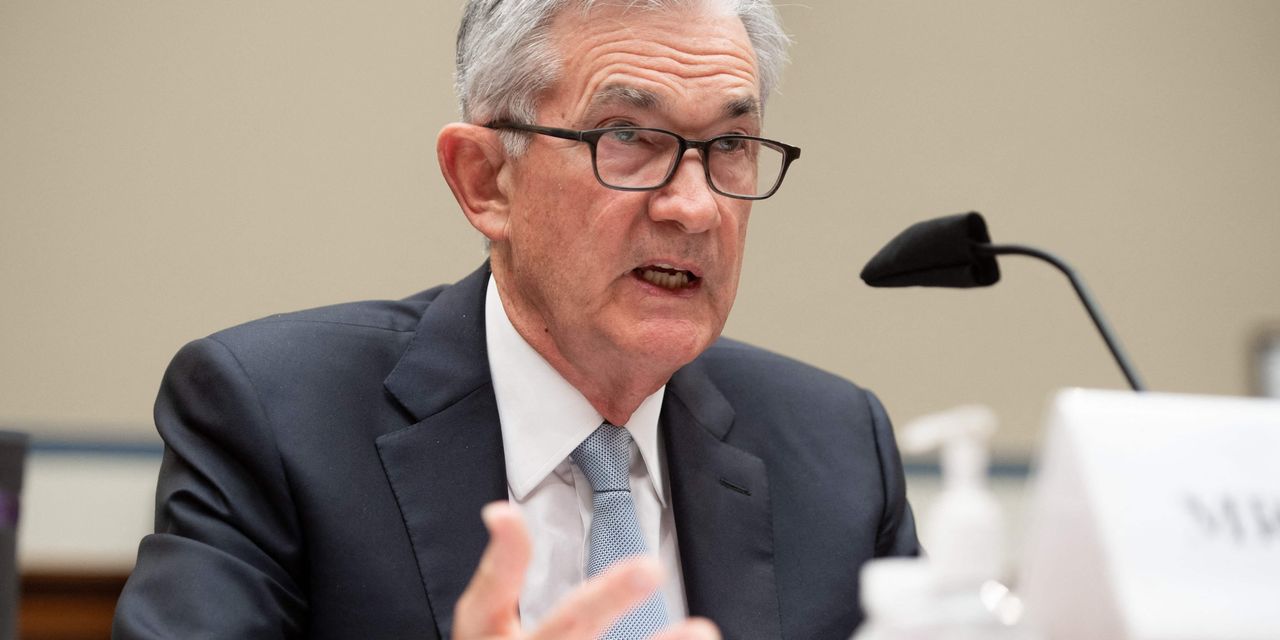WASHINGTON—Federal Reserve Chairman
Jerome Powell
said it’s highly unlikely that inflation will rise to levels seen in the 1970s but acknowledged significant uncertainty as the economy reopens.
While the Fed anticipated that the end of the pandemic would temporarily push up inflation this year, Mr. Powell said Tuesday on Capitol Hill that the increases in prices have been larger than central bankers had expected and may prove more persistent. But he underscored his view that shortages—including of used cars, computer chips and workers—will fade over time, bringing inflation closer to the Fed’s 2% long-run target.
“If you look behind the headline and look at the categories where these prices are really going up, you’ll see that it tends to be areas that are directly affected by the reopening,” Mr. Powell said in a hearing before a House subcommittee. “That’s something that we’ll go through over a period. It will then be over. And it should not leave much of a mark on the ongoing inflation process.”
Fed officials last week increased their median forecast for inflation this year. They project consumer prices in the fourth quarter of 2021 will rise 3.4% from a year before. That is up from their 2.4% forecast in March. The change came after a spate of high inflation readings pushed the 12-month gain in the consumer-price index to 5% in May, its highest level since 2008.
Mr. Powell said that while he has “a level of confidence” in the prediction that inflation will start to subside, “it’s very hard to say what the timing of that will be.”
Fed officials voted last week to keep short-term rates near zero, where they have been set since March 2020, and to continue buying at least $120 billion of Treasury and mortgage bonds each month until the economy heals further.
Mr. Powell reiterated that the central bank will tighten policy if necessary to keep inflation under control.
Though Tuesday’s hearing was set up to focus on lessons learned during the Fed’s response to the Covid-19 pandemic, lawmakers from both parties pressed Mr. Powell on the outlook for inflation.
“When Congress spends trillions of dollars and the Fed prints money, something’s got to give,” Rep. Mark Green (R., Tenn.) said. He asked Mr. Powell whether the price increases seen in recent months are “the start of something that could be as bad as the ‘70s,” when inflation reached double digits.
Mr. Powell said such a scenario is “very, very unlikely,” in part because the central bank “is strongly prepared to use its tools to keep us around 2% inflation.”
“
‘We’re digging out of a very deep hole. We’ve made a lot of progress but…we have a long way to go.’
”
Rep. Carolyn Maloney (D., N.Y.) expressed concern that the Fed might raise rates too early and hamstring the economic recovery. “I strongly believe that the recent spike in inflation will only be temporary, and that shouldn’t cause the Fed to raise interest rates too soon,” she said.
Fed officials signaled last week they expected to start raising interest rates sooner than they had previously expected. Most of them now expect to raise the overnight federal-funds rate by at least half a percentage point by the end of 2023, according to quarterly forecasts released last week. In their previous forecasts, released in March, most expected to leave the rate near zero through 2023.
In addition, they began discussing an eventual scaling-back, or tapering, of the Fed’s bond purchases.
The Fed said it plans to continue buying bonds at the current pace until the economy makes “substantial further progress,” measured from December, toward its goals of full employment and sustained 2% inflation. The officials haven’t set clear benchmarks for either of those criteria, but many private economists believe they could begin tapering later this year.
The economy’s recovery this year has been much faster than expected, thanks to steady progress on vaccinations, declining Covid-19 cases and trillions of dollars of fiscal stimulus. Total economic output is expected to surpass pre-pandemic levels in the current quarter, and a variety of indicators suggest workers are enjoying more leverage, as firms scramble to keep up with demand.
Meanwhile, the labor market’s recovery has been somewhat slower than Mr. Powell had hoped earlier in the spring.
Mr. Powell cited some possible reasons for the sluggishness: lingering concerns about contracting or spreading Covid-19, heightened child-care responsibilities as schools remained closed and enhanced unemployment benefits allowing workers to prolong their job searches. He also said that because most unemployed workers are now applying for new jobs rather than their old ones, hiring could take some time to ramp up.
But the Fed chairman stressed that the economy is likely headed for a strong labor market and should see stronger job creation in the fall.
“We’re digging out of a very deep hole,” Mr. Powell said. “We’ve made a lot of progress but…we have a long way to go.”
SHARE YOUR THOUGHTS
How would you grade the Fed’s handling of the economic crisis during the pandemic? Join the conversation below.
A Strengthening Recovery
More WSJ coverage of the economy, selected by the editors
Write to Paul Kiernan at paul.kiernan@wsj.com
Copyright ©2020 Dow Jones & Company, Inc. All Rights Reserved. 87990cbe856818d5eddac44c7b1cdeb8














































